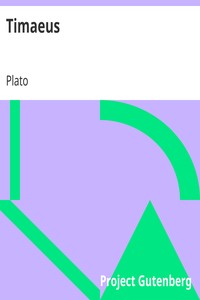Timaeus by Plato
"Timaeus" by Plato is a philosophical dialogue written around 360 BC. Through lengthy monologues, the work explores the nature of the physical universe and humanity's place within it. A divine craftsman—the demiurge—brings order from chaos, shaping the cosmos according to eternal, perfect forms. The dialogue examines why the world exists as a living, intelligent whole and how the elements were organized from primordial disorder. It also references the legendary tale of Atlantis,
setting the stage for deeper cosmological speculation. (This is an automatically generated summary.)
Read or download for free
| How to read | Url | Size | |||
|---|---|---|---|---|---|
| Read now! | https://www.gutenberg.org/ebooks/1572.html.images | 470 kB | |||
| EPUB3 (E-readers incl. Send-to-Kindle) | https://www.gutenberg.org/ebooks/1572.epub3.images | 216 kB | |||
| EPUB (older E-readers) | https://www.gutenberg.org/ebooks/1572.epub.images | 222 kB | |||
| Kindle | https://www.gutenberg.org/ebooks/1572.kf8.images | 361 kB | |||
| older Kindles | https://www.gutenberg.org/ebooks/1572.kindle.images | 337 kB | |||
| Plain Text UTF-8 | https://www.gutenberg.org/ebooks/1572.txt.utf-8 | 465 kB | |||
| Download HTML (zip) | https://www.gutenberg.org/cache/epub/1572/pg1572-h.zip | 210 kB | |||
| There may be more files related to this item. | |||||
Similar Books
About this eBook
| Author | Plato, 428? BCE-348? BCE |
|---|---|
| Translator | Jowett, Benjamin, 1817-1893 |
| Title | Timaeus |
| Note | Wikipedia page about this book: en.wikipedia.org/wiki/Timaeus_(dialogue) |
| Credits | Sue Asscher and David Widger |
| Reading Level | Reading ease score: 54.1 (10th to 12th grade). Somewhat difficult to read. |
| Language | English |
| LoC Class | B: Philosophy, Psychology, Religion |
| LoC Class | PA: Language and Literatures: Classical Languages and Literature |
| Subject | Classical literature |
| Subject | Cosmology -- Early works to 1800 |
| Category | Text |
| EBook-No. | 1572 |
| Release Date | Dec 1, 1998 |
| Most Recently Updated | Apr 25, 2021 |
| Copyright Status | Public domain in the USA. |
| Downloads | 3413 downloads in the last 30 days. |
| Project Gutenberg eBooks are always free! | |

